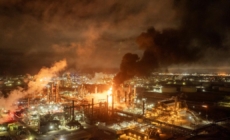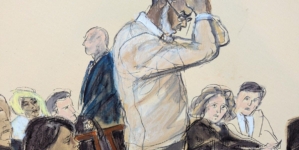-
Giants’ Asking Price for QB Russell Wilson Revealed - 14 mins ago
-
Taylor Swift explores fame and heartbreak in ‘Elizabeth Taylor’ track - 27 mins ago
-
NFL Week 5 Injury Report, Inactives: Lamar Jackson Out, Jayden Daniels In - 36 mins ago
-
Chevron’s El Segundo refinery has a history of safety, environmental violations - 40 mins ago
-
Knicks’ Mike Brown Making Drastic Change From Tom Thibodeau - 53 mins ago
-
‘Beat It Wally!’: A-Rod Trolls Papi With Red Sox Mascot’s Head After Playoff Exit - about 1 hour ago
-
Lawyers for Sean ‘Diddy’ Combs Plan to Appeal 4-Year Prison Sentence - 2 hours ago
-
The show must go on: Pacific Airshow attendees grieve over absent U.S. aircraft amid government shutdown - 2 hours ago
-
Will Aaron Judge rise to the occasion in October?, Yankees vs. Blue Jays ALDS preview - 2 hours ago
-
Robert Griffin III Reveals Unfortunate Injuries Suffered In ‘Scary’ Car Crash - 2 hours ago
Donald Trump issues ultimatum to American flag burners
President Donald Trump, writing on Truth Social, informed “ICE, Border Patrol, Law Enforcement, and all U.S. Military” that “from this point forward, anybody burning the American Flag will be subject to one year in prison” in accordance with a previous executive order.
Newsweek contacted the White House and Department of Justice for comment on Saturday via email and online inquiry form, respectively, outside regular office hours.
Why It Matters
Trump’s executive order instructing the immediate arrest and one-year imprisonment of individuals who burn the American flag has sparked debate over free speech, patriotism and the limits of executive authority.
The order challenges decades-old Supreme Court decisions that upheld flag burning as a constitutionally protected form of expression, placing the issue at the intersection of law-and-order policy and First Amendment rights.
What To Know
On August 25, Trump signed an executive order directing federal agencies—including the Department of Justice, U.S. Immigration and Customs Enforcement (ICE), Border Patrol, law enforcement and all U.S. military branches—to enforce laws concerning flag desecration and to seek the maximum penalties for violations.
Trump doubled down on Saturday, writing on Truth Social: “To ICE, Border Patrol, Law Enforcement, and all U.S. Military: As per my August 25, 2025 Executive Order, please be advised that, from this point forward, anybody burning the American Flag will be subject to one year in prison. You will be immediately arrested. Thank you for your attention to this matter!”
The president’s executive order does not establish new criminal penalties for flag burning; rather, it directs the Justice Department to more aggressively prosecute cases under existing laws and to refer possible violations to state and local authorities when applicable.
According to the official White House fact sheet, the order also seeks to clarify the limits of the First Amendment surrounding acts that incite violence or threaten public safety. The order also calls on the secretaries of state and homeland security to take immigration-related actions, such as denying visas or pursuing removal, for foreign nationals who engage in flag desecration.
Supreme Court decisions in Texas v. Johnson (1989) and United States v. Eichman (1990) both protected flag burning as free speech under the First Amendment, suggesting that any attempt to criminally charge individuals for such acts would likely face legal challenges.
One person was arrested after burning the U.S. flag outside the White House on August 25, hours after Trump issued the executive order.
What People Are Saying
White House spokesperson Abigail Jackson told Newsweek: “President Trump will not allow the American Flag, a symbol of our country’s greatness, to be used as a tool to incite violence and riots threatening the safety of Americans. President Trump will always protect the First Amendment while simultaneously implementing commonsense, tough-on-crime policies to prevent violence and chaos.”
What Happens Next
Trump’s executive order sets the stage for imminent legal challenges and possible court intervention if arrests occur under the directive. Any criminal prosecutions related to flag burning will almost certainly be scrutinized in light of the Texas v. Johnson and United States v. Eichman precedents, both of which explicitly protected flag burning as constitutionally protected speech.
If the Department of Justice pursues such cases, courts will need to consider whether the facts meet the exceptions noted by the Trump administration, such as incitement to violence or imminent lawless action.
Source link































